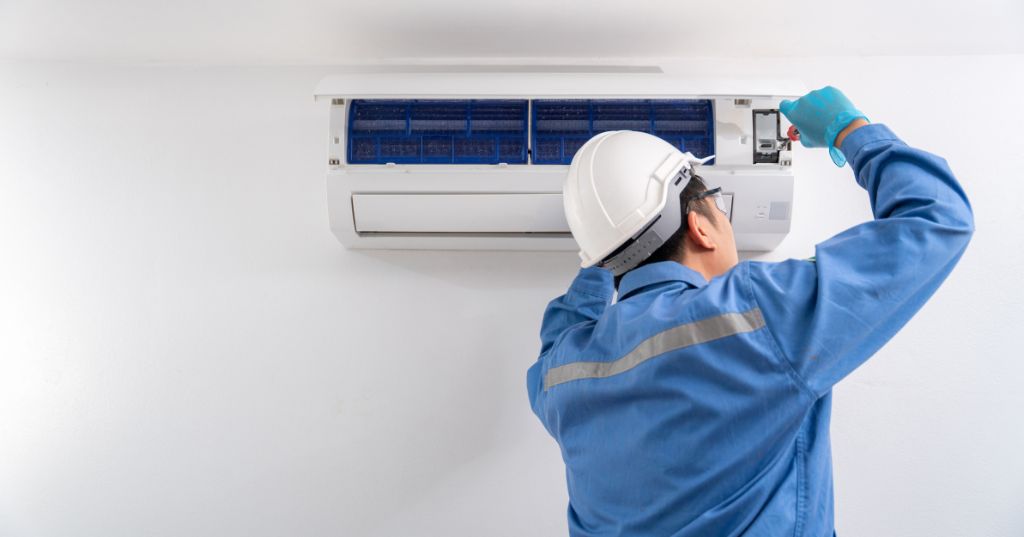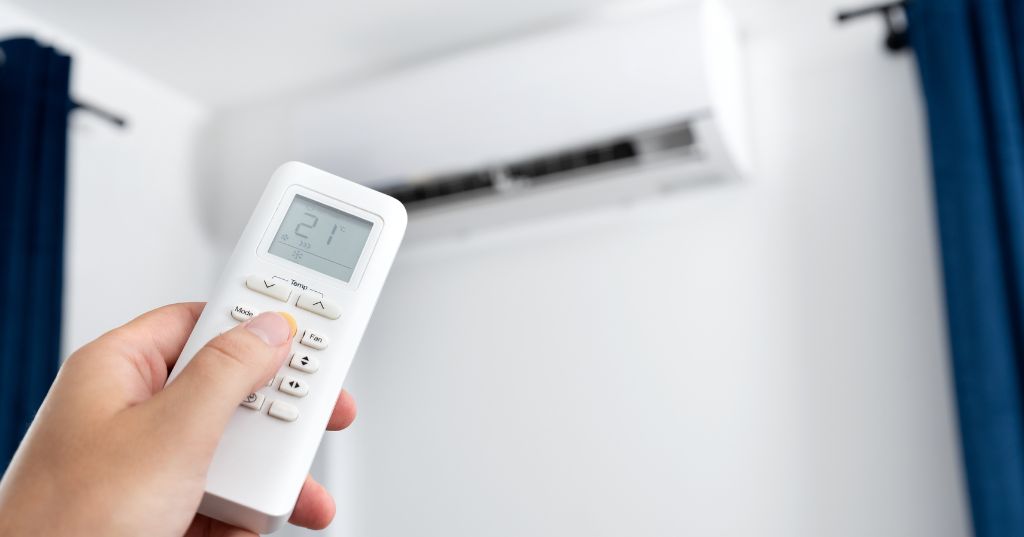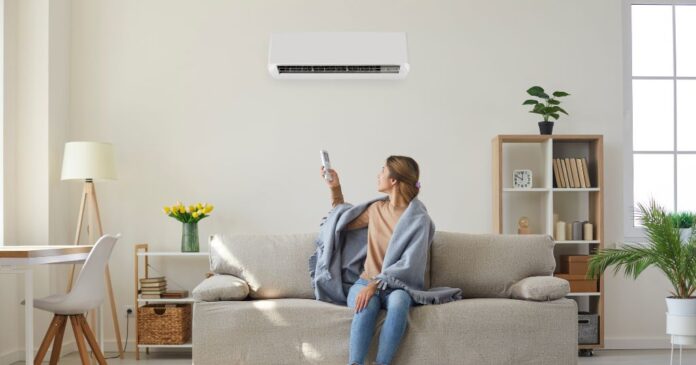In the scorching heat of summer, a functional air conditioner becomes sustenance for inside comfort. However, it can be immensely unsatisfying when your air conditioner unexpectedly powers down, leaving you in discomfort. This article researches into the myriad aspects that why does my conditioner turn off by itself without warning. We will also provide insights into effective troubleshooting techniques to tackle these issues frontal.
Why Does My Air Conditioner Turn Off By Itself?
If you have ever observed your air conditioner turn off by itself suddenly it may have left you doubting what’s making happen the issue. The truth is, there are numerous potential reasons why your air conditioner turn off by itself. We will discuss the most common reasons and what you can do to solution them.
1. Thermostat Quandaries

One of the most widespread reasons for your air conditioner to cease operation spontaneously is often traced back to improper thermostat settings. The thermostat acts as the courage center of your HVAC system, and any discrepancies in its settings can disturb the cooling process. Here are some thermostat-related worries to keep in mind:
a. Temperature Settings: Ensure that your thermostat is adjusted to your preferred temperature. Sometimes, a minor adjustment can correct the problem.
b. Battery Matters: If your thermostat depends on batteries, depleted or dead batteries can lead to faults or unexpected shutdowns. Changing the batteries should be your first troubleshooting step.
c. Programmable Predicaments: For those with programmable thermostats, cross-check the arranged settings to align them with your cooling needs. Incorrect programming can frequently be the culprit behind untimely shutdowns.
2. Filthy Air Filters
Clogged or dirty air filters wield important influence over your air conditioner’s efficiency. When these filters become overfilled with dust and debris, they impede airflow, resulting in a host of issues, including premature shutdowns. Let’s discover how dirty air filters influence your AC:
a. Airflow Reduction: As the air filter accumulates debris, it blocks the smooth flow of air through the system as the air. This diminishes the AC’s capacity to cool your living space, eventually causing it to power off to prevent overheating.
b. Overheating Hazards: The limited airflow can lead to the evaporator coil becoming excessively cold, causing the unit to freeze. In reply, modern air conditioners are prepared with safety mechanisms that trigger a closure when freezing is detected.
c. Escalated Energy Consumption: A clogged air filter forces the AC to work harder, consuming more energy and increasing the risk of overheating and shutdowns. Following the manufacturer’s procedures for regular air filter examination and replacement is essential.
3. Electrical Hiccups
Several electrical problems can instigate unplanned shutdowns of your air conditioner. These electrical issues can distance from minor concerns to complex faults:
a. Circuit Breaker Trips: Your air conditioner is related to an electrical circuit within your home. Overloads or short circuits can trip the circuit breaker, cutting off power to the AC unit. Finding the issue and resetting the circuit breaker or seeking assistance from an electrician can resolution this problem.
b. Wiring Woes: Damaged electrical wiring, whether within the AC unit or the home’s electrical system, can lead to sporadic power breaks, causing unexpected shutdowns. If visual inspections reveal any wiring issues, engage a skilled technician for repairs.
c. Capacitor Conundrums: Capacitors within your AC unit store and release electrical energy to pledge compressor and fan motor functions. A faulty capacitor can outcome in the AC shutting down. Capacitor testing and changed by a technician may be necessary.
4. Refrigerant Leaks
Refrigerant works as the agent responsible for cooling the air within your air conditioner. When a refrigerant leak happens, it concessions the AC’s cooling capacity, potentially leading to shutdowns. The following facts elucidate how refrigerant leaks trigger early shutdowns:
a. Cooling Capacity Reduction: Refrigerant leaks cause a diminution in the AC’s cooling capacity. As the AC fights to maintain the desired temperature, it may power down to avoid overheating or further damage.
b. Icing Issues: Insufficient refrigerant stages can cause the evaporator coil to freeze, triggering the AC’s safety devices and prompting it to shut down.
c. Inefficient Operation: An AC with a refrigerant leak must work tougher to cool your home, resulting in increased energy consumption and regular shutdowns. Upon distrusting a refrigerant leak, enlist the services of a professional HVAC expert for identification and repair, as refrigerant handling requires specialized equipment and expertise.
5. Obstructed or Unclean Condenser Unit

Placed outside your home, the condenser unit plays a pivotal role in the cooling course. When it becomes blocked, it can force your air conditioner to power off unexpectedly. The subsequent points clarify how a dirty or blocked condenser unit impacts your AC:
a. Heat Dissipation Reduction: The condenser unit discharges the heat collected from your indoor air. When it is encrusted with dirt, debris, or vegetation, it loses its capability to efficiently dissipate heat. Consequently, the system powers down to stop overheating.
b. Overheating Threat: As the condenser struggles to discharge heat, it can result in overheating and compressor damage. Many AC units include safety switches that activate system shutdowns to safeguard against such issues.
To stop these problems, it is advisable to regularly clear the area surrounding the condenser unit, eliminating debris and safeguarding unobstructed airflow.
6. Sensor Snags
Modern air conditioning systems join various sensors to monitor conditions and optimize performance. A malfunctioning or dirty device can provoke your AC to power down. The following points elaborate on sensor-related concerns:
a. Thermostat Sensor: The thermostat sensor actions the air temperature entering the evaporator coils. If it becomes soiled or defective, it might provide inaccurate readings, prompting premature AC shutdowns.
b. High-Pressure Sensor: High-pressure sensors are planned to identify excessive pressure within the refrigerant lines. If they detect a problem, the AC may power down to avert damage.
c. Low Refrigerant Sensor: Some AC units feature low refrigerant sensors that pledge shutdowns when refrigerant levels drop knowingly.
To address sensor-related matters, refer to your AC’s user guide to locate and clean sensors if possible. If the issue persists, engage a professional technician for analysis and repair.
7. Condensate Drainage Dilemmas
They produce condensate that necessitates proper drainage as air conditioner cool the air. Flaws in the condensate drain system can power your AC to shut down. Common issues include:
a. Blocked Drain Line: Over time, the condensate channel line can accumulate algae, mold, or debris, leading to water stoppage. These triggers a care switch those powers off the AC.
b. Damaged Drain Pan: A damaged or cracked drain pan beneath the evaporator coil can result in water leakage, causing the system to shut down.
To block condensate drain problems, schedule periodic checks and cleaning of your drain line by a expert technician.
8. Air Duct Dilemmas
Problems with your home’s air ducts can also conclude in spontaneous shutdowns of your air conditioner. Inadequately maintained or damaged ductwork can block airflow and cause the system to overheat. To prevent from this situation, consider the following:
a. Duct Cleaning: Periodic duct cleaning can remove debris, dust, and obstructions, ornamental airflow and preventing unexpected shutdowns.
b. Duct Sealing: Leaky ducts can allow cool air to outflow before reaching your living spaces. Proper sealing can recover efficiency and reduce the strain on your AC, potentially stopping shutdowns.
Conclusion
An air conditioner turn off by itself unexpectedly can be difficult and discomforting, particularly during the sweltering summer months. Understanding the original causes, such as thermostat issues, dirty filters, electrical difficulties, refrigerant leaks, condenser unit obstructions, sensor malfunctions, condensate drainage problems, and air duct dilemmas, can empower owners to troubleshoot and address these concerns efficiently.
Routine maintenance, professional inspections, and prompt repairs are key to confirming your air conditioner operates smoothly and reliably, keeping your indoor atmosphere cool and comfortable.

































